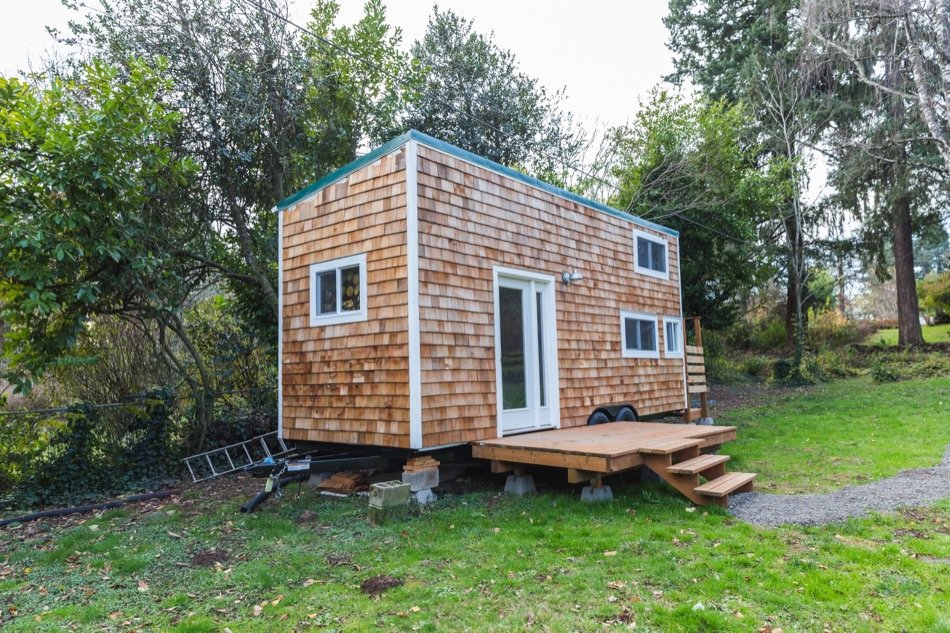What You Need To Know Before Buying a Tiny Home
Posted by Justin Havre on Tuesday, April 16th, 2019 at 1:43pm.
 Downsizing is a great option for many home buyers, but right now some people are taking downsizing to the extreme by building or buying tiny homes. Tiny homes are exactly what they sound like, but in order for a tiny home to truly be tiny, it should fall between 400-600 square feet, though some can be as small as just 160 square feet. They cost anywhere from $10,000-100,000 depending on how it’s made, which can make them sound appealing, but tiny homes come with a lot of risks and variables that need to be accounted for. Here is what every buyer needs to know before investing in a tiny home.
Downsizing is a great option for many home buyers, but right now some people are taking downsizing to the extreme by building or buying tiny homes. Tiny homes are exactly what they sound like, but in order for a tiny home to truly be tiny, it should fall between 400-600 square feet, though some can be as small as just 160 square feet. They cost anywhere from $10,000-100,000 depending on how it’s made, which can make them sound appealing, but tiny homes come with a lot of risks and variables that need to be accounted for. Here is what every buyer needs to know before investing in a tiny home.
For informational purposes only. Always consult with a licensed real estate professional before proceeding with any real estate transaction.
Tiny Homes are a Fad
Fads can be fun, and sometimes they do stick around for quite some time, but tiny homes are a very different kind of fad than bellbottoms or slap bracelets. Right now, homes that are less than 1,000 square feet account for less than 1% of homes in Canada, and tiny homes are an even smaller percentage of that. There aren’t many people interested in tiny homes, so selling them can be extremely difficult if the homeowner decides they no longer want their tiny home. There’s also no way to tell how popular tiny homes will continue to be in the future, so what may be a tough sell today might be nearly impossible in five or ten years.
Living in a Tiny Home is Difficult
With so little living space in tiny homes, there’s very little room for much else beyond the bare minimum. Many tiny homes don’t allow more than a few people to live inside them at once, so tiny homeowners who want to have large families or pets will find that they’ll be forced to upsize if they want to achieve these sorts of goals. Beds often require climbing a ladder in order to get into them, and bathrooms often double as laundry rooms. Interested buyers need to be completely sure that they are able to live in such a tiny space.
Tiny Homes Require Minimalistic Lifestyles
Because space is so limited in tiny homes, homeowners need to take every last thing they own into account. There is very little extra space for knickknacks and furniture, and because of this, tiny Southeast Calgary new homes force homeowners to live a minimalist lifestyle. For some people, this is fine, and they may already be living that sort of lifestyle. For others, having only what’s necessary to get by and little else is impossible. In order to live in a tiny home, homeowners need to be prepared to give up many things that they may love because there just won’t be enough room for it all.
It’s Difficult to Get a Mortgage for a Tiny Home
Because tiny homes are so small, many of them don’t qualify for home mortgages, which can be a big problem for buyers who need a loan in order to purchase one. One workaround some people use is getting a recreational vehicle loan instead, but this doesn’t work for everyone, either, because it needs to be certified by the Recreational Vehicle Industry Association. In order to be eligible for either loan, the buyer needs to ensure that their tiny home is made to specifications that follow the criteria. If the home is made to order, this can be simple, but if it’s premade, it may be impossible.
Tiny homes may be small, but they’re still a big investment. Tiny homes can be great for some people, but buyers interested in purchasing a one need to make sure they know exactly what they’re getting.
For informational purposes only. Always consult with a licensed real estate professional before proceeding with any real estate transaction.

